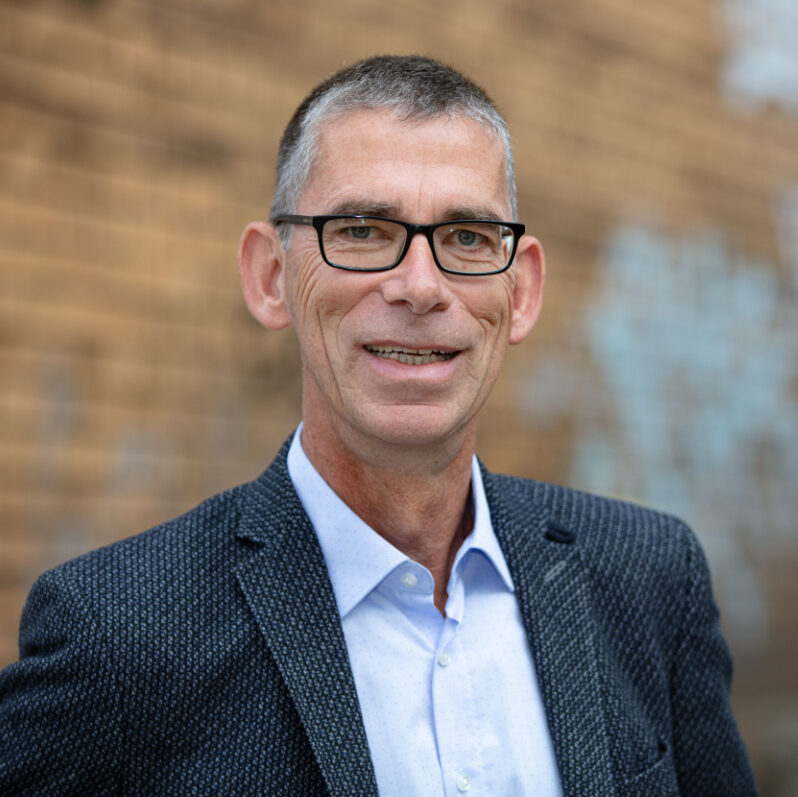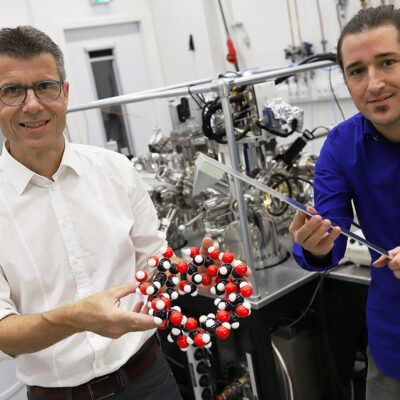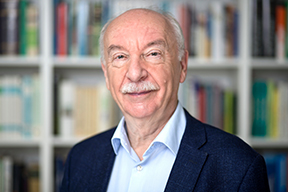The kind of accommodation given to refugees may impact on their health. But it is not just housing conditions that are important, says public health scientist Oliver Razum, it is also freedom of movement and being able to make one’s own decisions. Excessive controls, in contrast, could turn the time spent in the host country into a torment and a health risk.
Oliver Razum repeatedly returns to one pivotal sentence: ‘Refugees must have the chance to shape their lives themselves.’ Any assistance that is ultimately a disempowerment is not really help at all: it paralyses and frustrates. The scientist also calls for refugees to be granted the same access to healthcare as the majority population.
Professor Dr Oliver Razum is a physician and epidemiologist. He teaches and conducts research at Bielefeld University’s School of Public Health. The 59-year-old is an expert on migration, globalization, and health inequalities. Razum has studied the housing of refugees very closely. For him, this is not just theory: during his three years as a district doctor in Zimbabwe, he became familiar with institutionalized, but also decentralized forms of housing for refugees in southern Africa.
At Bielefeld University’s Center for Interdisciplinary Research (ZIF), he will soon be organizing an international workshop on the challenges involved in the reception and housing of refugees, and asking what awaits them in Germany and other industrial countries. The conference is entitled ‘Paradise or Purgatory?’.
Harassed by controls and lack of privacy
‘We borrowed the title from Hannah Arendt,’ Razum explains. She categorized camps after the Nazi era so that we could talk about different types of camps without relativizing the Shoah. Today, according to the public health scientist, housing for refugees ranges from their own apartments, across residential homes, to reception centres that resemble camps.
‘Classic camps are often lawless places. And they still exist today—for example in Australia,’ criticizes Razum. There was a camp on Manus Island, 3,700 kilometres north of Canberra, for boat refugees who had tried to enter Australia in an irregular manner. Conditions there corresponded to those of a total institution, Razum wrote in an article with colleagues. The scientists base such an assessment on the following criteria: work and play are prohibited, there is no privacy, food distribution is deliberately chaotic, the refugees are deliberately given clothing that does not fit, and controls are extensive.
But above all, says Razum, people are housed there because of an administrative directive and not because of a court ruling. ‘That means they have no idea how long they’ll be interned. Any placement in a detention centre is subject to clear rules and involves certain rights for those detained. In the camps, however, there is no chance of fighting arbitrariness.’ In North Africa, he criticizes, the situation is similar: ‘In the reception camps there, which were set up with the knowledge of the EU, we find lawless places and catastrophic structures.’ In Germany, the housing is incomparably better. But even here in our country, facilities differ greatly. ‘In this workshop, we shall develop a categorization and ask how we can describe refugee housing systematically.’ An important criterion will be to assess factors that impact negatively on refugees’ health.
Listen and examine what is feasible
‘In our research, we sometimes work with the broken window index used to describe the physical environment of a district or neighbourhood. For refugee housing, however, this alone is not a sufficient criterion.’ According to Razum, it is just as important for the people living there to face as few restrictions as possible to their freedom. In refugee housing, for example, social workers can contribute to what experts call empowerment: they try to help people take control of their own lives. However, it is absolutely essential for housing facilities not to resemble a detention centre. ‘If this can be avoided, even shared housing can have a positive side to it,’ Razum believes.
Empowerment takes various forms: ‘I don’t know what might be important from a refugee’s point of view. Perhaps they want to learn how to use public transport; or maybe they would like to use a university library.’ The key is to listen, examine what is feasible, and to campaign politically for the necessary changes in structures. ‘However, the key issue is always that people should be offered clear perspectives!’ Those who are kept in limbo wonder whether they should bother at all with topics such as waste separation or learning the German language.
Razum also takes a clear stance on the question of healthcare for refugees: ‘We have a certain standard that everyone should receive — refugees or EU citizens alike.’ And even if things are much worse in their countries of origin — it is an ethical responsibility.
A call for healthcare above and beyond acute cases
It is unacceptable to the medical profession that refugees are only granted care for acute conditions in the first 15 months of their stay — for example in the event of toothache, appendicitis, heart attack, or pregnancy. In the worst case, a chronic illness such as diabetes would remain untreated if the treating physicians were unaware of the exception clause in the Asylum Seekers’ Benefits Act. Moreover, Razum is concerned by the questionable way that healthcare regulations vary between the federal states and even between the municipalities within each state: ‘Asylum seekers should receive the same entitlement to healthcare as the majority population throughout the country.’ This is why Razum is pleading for a corresponding amendment to the Asylum Seekers’ Benefits Act. ‘It wouldn’t be more expensive. Quite the contrary,’ he stresses. Admission to the standard system in combination with an electronic health card would not just mean less bureaucratic red tape. It would also mean that in the case of standard healthcare, therapies would be initiated before illnesses could become dangerously worse.
In addition to health and ethical reasons, economic aspects also speak against restrictive healthcare for refugees, according to Razum. Together with his colleague Professor Dr Kayvan Bozorgmehr, also a researcher at the School of Public Health, Razum calculated the annual per capita health expenditure for asylum seekers from 1994 to 2013. With limited access to medical care, expenditure was 40 per cent (and thus 376 euros) higher per person and year than for asylum seekers entitled to benefits corresponding to those available from the statutory health insurance scheme. ‘Parallel systems are expensive and inefficient.’ In order to avoid misunderstandings due to language difficulties or even the risk of not receiving the necessary treatment, an additional model for financing interpreters is necessary. This is true for ‘normal’ medical care, but also for traumatized people in need of therapy. ‘This is an area in which we currently face a shortage and more demand than supply.’
This article is from „BI.research“, Bielefeld University’s research magazine. The latest issue is available here.





